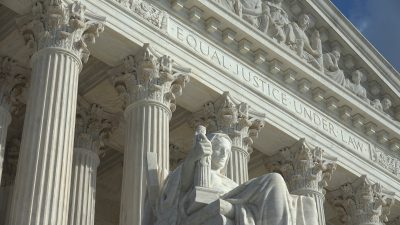Legal System
A just and fair legal immigration system upholds due process and adherence to the rule of law, while effectively managing immigration. Our efforts work to uphold the best version of the system, holding government entities accountable for fairly enforcing policies and addressing injustices at all levels of government.
What does the constitution say about due process?
The Fifth Amendment to the Constitution says clearly that no person shall be deprived of life, liberty, or property without the due process of law. Note that this says person, not citizen, and over the years the Supreme Court has consistently ruled that the Due Process Clause applies to all people in the United States.Do non-citizens have the right to due process in the U.S.?
Yes. The Constitution guarantees due process rights to all "persons," not just citizens. This means non-citizens, including undocumented immigrants, are entitled to fair treatment under the law. This includes the right to defend themselves in court. But recent Trump administration policies that speed up deportations and limit access to legal representation make it harder for non-citizens to get their fair day in court.- Access to legal representation Access to legal counsel is an essential part of our justice system and our democracy. In the criminal justice system, anyone facing even one day in jail gets a lawyer if they can't afford one. But immigrants facing deportation usually don't get that chance.The research is clear – the most effective way to ensure some level of due process for people navigating our complicated immigration system is for them to have trained attorney at their side. But Trump administration is now working to strip attorneys from as many people as possible, all in the name of increasing its deportation numbers. This attempt to eliminate basic due process will hurt people who already have few options.
- Fair day in court Due process guarantees that individuals have the opportunity to defend themselves in court. This includes non-citizens facing deportation.
Why is due process important?
We are seeing right now the importance of due process when it comes to President Trump's actions to carry out the so-called Alien Enemies Act, a 1798 wartime law that permits people to be deported outside of the normal framework of immigration law. President Trump has alleged that this law allows him to simply point at any person, declare them to be an alien enemy, and kick them out of the country without ever having a chance to see a judge. Thankfully, the Supreme Court said that is not true, and in a unanimous decision, ruled that people can challenge the Trump administration's invocation of the Alien Enemies Act. That is why due process is so important, because it means that no person can be rounded up and sent to another country without a chance to go to court and make the government prove their case.How is the American Immigration Council working to protect due process?
- We serve thousands of individuals in immigration detention centers through the Immigration Justice Campaign, our initiative with the American Immigration Lawyers Association. The Justice Campaign provides free legal services for immigrants who would otherwise have to navigate our complicated immigration system without a lawyer.
- We use the courts to demand a fair process for immigrants. Our litigation team is fighting back against the Trump administration’s blatant disregard for due process including filing a lawsuit challenging their illegal detention of immigrants in El Salvador’s notorious Terrorism Confinement Center (CECOT).

Court Hears Challenge to Asylum Turnback
On October 13, the U.S. District Court for the Southern District of California will hear arguments in Al Otro Lado and Haitian Bridge Alliance v. Mayorkas, a federal lawsuit challenging the Biden administration’s unlawful policy of turning back people seeking asylum without a CBP One appointment. Read More

What Does the Looming Government Shutdown Mean for Our Immigration System?
After weeks of failed negotiations on spending, Congress has less than a week left to avert a potential government shutdown. Members of the House Republicans’ Freedom Caucus have refused to pass any spending bill for the Department of Homeland Security (DHS) unless it contains HR2, their massive… Read More

New Immigration Court Rule Would Protect Critical Docket Management Tools and Rescind Trump-Era Changes
The Department of Justice has proposed a new rule to protect immigration judges’ ability to administratively close removal proceedings and control their ever-expanding dockets. The proposed rule, published on September 8, would also rescind most of the changes introduced by a 2020 Trump-era regulation, including shortened Board of Immigration… Read More

Newly Proposed Appellate Rule Would Overturn Trump-era Restrictions for Immigration Judges and Codify Judicial Discretion
On Thursday, the Biden administration proposed to rescind a Trump administration rule that stripped authority from immigration judges to manage their own dockets; here is our response. Read More

With Challenge to CHNV Parole Program, the ‘Right to Welcome’ Goes on Trial in Texas
The Biden administration’s humanitarian parole program for Cubans, Haitians, Nicaraguans, and Venezuelans (CHNV) went on trial last week. The trial, held in a federal court in Texas, was the result of a lawsuit filed in January 2023 (shortly after the program was expanded to Cuba, Haiti, and Nicaragua) by Texas… Read More

Practice Alert: Overview of the Supreme Court’s Decision in Pugin v. Garland
This practice advisory looks into the decision by the U.S. Supreme Court issued in Pugin v. Garland, 143 S. Ct. 1833 (2023). This immigration decision addressed the generic definition of the obstruction of justice aggravated felony ground at 8 U.S.C. § 1101(a)(43)(S). Read More

Law Criminalizing ‘Encouragement or Inducement’ of Immigrants to Live in the US Unlawfully Is Upheld in SCOTUS Case
Written by Kelly Chauvin, Summer 2023 Legal Intern for the American Immigration Council Last month, the U.S. Supreme Court held that a section of immigration law that forbids “encourag[ing] or induc[ing]” a non-citizen to enter or reside in the United States did not violate the U.S. Constitution’s protection of free… Read More

Council Sues EOIR To Find Out Why Immigrants’ Court Hearings Are Moved Up on Short Notice
This FOIA suit seeks to compel EOIR to provide information about the immigration courts’ practice of advancing the date of immigrants’ hearings without much notice to them or their attorneys. Read More

Legal Advocates to File Lawsuit Challenging the Constitutionality of Florida’s Anti-Immigrant Law
The Southern Poverty Law Center, American Civil Liberties Union, ACLU of Florida, Americans for Immigrant Justice, and American Immigration Council have announced they will file a federal lawsuit challenging Florida’s draconian Senate Bill 1718, which goes into effect, July 1. Read More

Is Chevron deference on the Supreme Court’s chopping block?
The Supreme Court has agreed to decide a case that asks the Court to overturn Chevron v. National Resources Defense Council—an influential decision that requires courts to defer to federal agencies’ reasonable interpretations of ambiguous laws. The Supreme Court’s decision to take the case about fishing… Read More
Make a contribution
Make a direct impact on the lives of immigrants.
